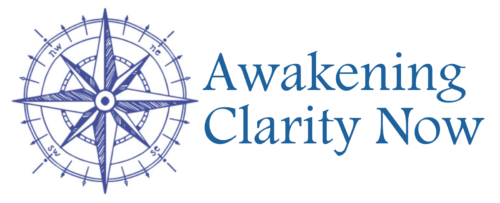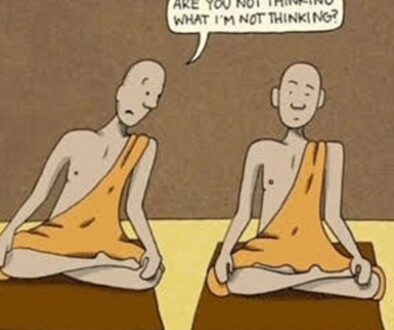From Desolation to Deliverance: New Autobiographical Article in ONE: The Magazine

WELCOME!
Today’s post is an excerpt from a new, long biographical article that is currently appearing in ONE: The Magazine. You’ve heard me speak of this online publication before. It’s owned and edited by Shanti Einolander, who’s been a leader in this community for quite a long time. (She’s Gangaji’s book editor and frequent travel companion, and the actual writer behind Kenny Johnson’s The Last Hustle from Non-Duality Press.)
Shanti wanted me to write an original article about my whole spiritual journey, from when I first became a seeker, and the early days of that journey, on through the days of homelessness and despair as a park bum in Portland, Oregon and on up to the present. She asked me to put special emphasis on my initial awakening and that journey, which still continues. Of course I couldn’t get everything into a 4,000 word article, but the grittiest stuff I’ve ever put online about those days is in there, as well as the most recent information on that continued clearing.

FROM DESOLATION TO DELIVERANCE
When alcoholism has stolen your livelihood, your relationships, and your dignity, when you feel that you don’t want to live but neither can you clearly die, nothing short of divine intervention can deliver you from such desolation. That grace arrived for Fred Davis during a stint at a psychiatric hospital in 1982, when a voice inside his head said, simply, “You should study zen.” It was the beginning of an up and down, meandering spiritual path that would one day culminate in a spiritual awakening so sudden and powerful, he’d move “from utter misery to bliss in the blink of an eye.”
I was right on the edge of death.
It was early autumn of 1998 when I found myself living in Mount Tabor City Park in Portland, Oregon. Yes, I was living there, in a park, in the bushes, scared and hungry, with blisters on my feet the size of the palm of your hand. When you’re homeless, the police don’t even want to arrest you. You’re not worth the trouble. So they just nudge you along, keeping you moving, moving, always moving. Not on my beat, buddy.
I had sold my sleeping bag to buy a couple of bottles, and then I’d caught some kind of lung infection. My voice sounded like rocks grinding against each other. I wished I would die, but I noticed I didn’t. That’s the funny thing about alcoholism; it kills you if and when it wants to, not when you want it to. As the booze ran out and I began to have to face reality, I couldn’t help but look back to a decade before.
In 1988 I had been living in the suburbs of Columbia, South Carolina. I owned an enormously successful comic, gaming, and science fiction shop. I had a great wife, a nice house, four nice cars, and according to my lawyer and accountant, I had a fine future ahead of me. All I had to do was not screw it up. That’s a difficult thing for a practicing alcoholic to avoid. I had not the first clue on how to handle success, because it wasn’t anything I was particularly familiar with. I was a crazy man with money.
But let’s drop back a little further. When I used to tell my story in public I got to where I told it backwards, just to make sure I kept both me and the audience awake. I guess I’m doing that here as well.
In 1982 I woke up—that’s always what it felt like at the end of a long run of drunkenness and active insanity—to find myself getting bed and board in the G. Werber Bryan Psychiatric Hospital in Columbia. This was a place where the doors were locked, I wasn’t issued a key, and I wasn’t allowed to play with anything sharp. I did get all the crayons I wanted.
This was my second visit to the same institution. I’d been there a year before and hadn’t learned a damn thing. I was not big on learning; I was big on repeating. I know now that it was all part of a vast pattern, but at that time I’m afraid I was unable to bring the “light of consciousness” to bear on my wanton lifestyle. This second time around, however, a voice went off in my head as I sat in the dayroom drawing with my crayons. From out of nowhere and clear as a bell it said, “You should study Zen.”
It would not have been any more ridiculous if the voice had said, “You should grow horns,” or “You should take a look at quantum physics.” Here is what I knew about Buddhism:
I had been out to Boulder and visited Chogyam Trungpa’s Naropa Institute, which is now a university. It certainly wasn’t then. This was 1976, and it was a wonderful madhouse with lots of serious Buddhists, artists, chakra workers, Rolfers and all kinds of folks who were misbehaving just badly enough to make things really interesting. However, I certainly wasn’t there for Buddhism and found it an annoying distraction to my chief task. I was a drunken, romantic poet, straight (in my mind) out of Jack Kerouac’s On the Road, and I was hunting down Allen Ginsberg at the Jack Kerouac School of Disembodied Poetics. I found him, too, along with Peter Orlovsky, Gregory Corso, and a bunch of other Beats I’d read about. Heady stuff. Great for drinking stories.
I happily invaded a house that the university owned and rented out to students. They generously housed me and kindly fed me, and in return I drank all their wine (several gallon jugs of it that I found in the basement where I slept in the bed Corso had recently abandoned). On my first night there at a party at Ginsberg’s, I met a lot of the characters who were in On the Road, and I thought I’d died and gone to heaven.
What I’m telling you is that here I was, in the very heart of a slowly awakening America, and I didn’t want any of it. Allen wanted to talk about sitting practice, and I wanted to talk about Howl, his wildly controversial literary bombshell. Fortunately, all of us wanted to drink, so I fit right in for a day or two. It was in the Naropa house that I made my first acquaintance with meditation cushions. I thought they made fine drinking stools, and if you fell off of them, you didn’t have far to fall, which was great.
This all took place about six years before I woke up in the psychiatric hospital and heard the voice in my head saying, “You should study Zen.” Prior to that strange moment in the asylum, that time in Colorado had represented the sum total of my knowledge—and interest—in things Buddhist or awakened, and as I sat in Bryan Psychiatric, I was—guess what—homeless and penniless. I had just come out of the Arizona desert where I had also nearly died. This was the only reason I paid any attention to that voice at all. If I’d had any other idea at all, I’m sure I wouldn’t be writing this today. But I didn’t have any other idea. What I did have was a voice in my head that spoke clearly and authoritatively and had a suggestion. So, to my amazement, when I was loosed from the institution—after promising not to kill myself right away and thus cast dispersions on their care—I took my voice’s suggestion.
This was the beginning of an off and on, up and down spiritual journey that was to last twenty-five years. Since there was no Zen in my town, I tried to join the Tibetans in my town, but soon discovered I wasn’t a joiner. If I wasn’t going to be made Dalai Lama, I didn’t need them, though they thankfully taught me how to meditate properly. Years later I tried to join the Zen crew in Portland, but once again, if there was no room for Fred Davis-Roshi, I just couldn’t be bothered.
So I studied and practiced independently, diligently, even relentlessly (when I studied and practiced). Then I started making money and all that quickly went away. However, once I drank my way out of all that money, I once again found the idea of spirituality appealing. It was a way for me to win. I thought if I could just get enlightened, hopefully with a bunch of followers (mostly women would be fine), then I could sort of feel like my waste of a fine slice of the American Dream had all been a clever plan. Of course it was all just madness.
In Portland, in 1992, I had my first real glimpse of my true nature. Sadly, I was deep in my cups at the time, and ego simply lapped that up and christened me, “special.” Understand, I was a drunken car salesman, but I nonetheless shaved my head, started wearing all black, and ran my poor wife off for a while. I eventually became functional again—for a practicing alcoholic, mind you—but that single night of freedom haunted me and taunted me like Dickens’ Christmas ghosts. I just couldn’t let go of it. It gnawed and gnawed at me, but reality just couldn’t quite get through the alcoholism and unveil itself again. Until it did, of course. But I’m getting ahead of myself again.
I got out of that park by powering my way through a couple of bureaucrats who were used to saying no to people who had better odds of recovery but less personal drive than I had. They told me to leave the crisis hospital and I said no. I kept saying no until they had a homeless shelter come pick me up and take me to the bed I’d been told didn’t exist. I bow to the city of Portland for their crisis, detox, shelter, and recovery programs. That saved my life, plain and simple. Thank you very much.
It took me another two years to get sober, but the park was my bottom. Not a week goes by that I don’t mention it, and it’s been almost fifteen years since I was there. For a while I went back and forth between Twelve Step recovery and drunkenness until I once again hit a very bleak spot, and the park rose up in my vision. I knew I couldn’t go there again. I couldn’t take that level of misery anymore. I knew I had to quit drinking, and I knew I couldn’t do it myself. So I turned myself in to the recovery people, fully surrendered—to my alcoholism only—at long last.
I was one of those guys who jumps into recovery with both feet. I hit the ground running and I didn’t stop moving for more than a decade. I got very involved in working the steps. I worked them poorly, as I see it now, but enthusiastically. I used to tell people that apparently God paid more attention to intent that she did form. I saw a lot of people do the steps perfectly who never got through them and ended up in the ditch again. More than anything on earth, I wanted to stay out of the ditch. Frankly, I didn’t want to stop drinking. Not for a minute. But I wanted a life again, and I wanted to stay out of the park, and if surrendering to formal recovery was what it took for me to stay sober, so be it. I personally, and a ton of guys I worked with for the next eleven years, benefited from that moment of clarity. Getting sober was the smartest decision I never made. Call it grace. There’s nothing else to call it.
I cut no corners. I would tell guys I worked with, “All I can do is tell you how I did it, and I did it the hard way; I did it their way.” And that’s the truth. I was cookie cutter recovery, straight out of the book. And it worked! I got sober, and my life began to stabilize. To this day, thirteen years later, I’ve never regained really solid financial footing. I never made it a priority. I made getting and staying sober a priority for a while, and then I made stretching the bounds of my spiritual experience a priority, and there just wasn’t time or opportunity for a whole lot else. I was 47 years old when I got sober, a guy with a heavily checkered past, so it made sense to make my demands minimal.
When I was 18 months sober I let myself read my first Zen book in a long time. It took about three minutes for me to see where I was headed: a Nondual path of recovery. I learned to transfer Nondual teachings into recovery-speak so that no one would be offended. When I got to the rooms of recovery, all I wanted was to get sober. Now that I was sober, all I wanted was enlightenment. I went at it as relentlessly as I went after sobriety.
In 2002, I discovered Eckhart Tolle, and that changed everything. I read, listened, watched, and dreamed Eckhart Tolle for the next two years. And it’s a damn good thing I did, because I was arrested in 2004 for having been a less-than-wonderful guy back in my drinking days. Some Ninth Step work, which is where we make amends for our wrongs, backfired on me. I spent the next two years in fear of prison as I waited for my trial. I didn’t go to prison, but I did land in an ugly life situation, and I wanted to die. But my then-girlfriend, now-wife’s business partner had shot himself in the head in 2002, and I had helped her clean up the detritus of his life and death. It was very ugly, and took a real toll on her, and there was no way on earth I was going to commit unblessed suicide on her. She promised she would bless it if things didn’t work out, but asked me to please give life a chance. Much to my chagrin, I did.
So, I felt like I couldn’t live, but I clearly couldn’t die either. I was caught in a vise. I didn’t see it coming, but this viceness is a perfect set-up for a spontaneous awakening, should one feel like making a visitation, so to speak. In September 2006, while sitting in my living room in total life delusion and misery, that “visitation” arrived for a second time, fourteen years after the first glimpse. This was more than a glimpse; a lot more. I came to know my true nature. In conventional spiritual language, I “woke up.”
It was quite an awakening—it felt like it took the top of my head off. I moved from misery to bliss in the blink of an eye. Suddenly, I knew. I knew who I was and I knew that everything was just fine, even the beat up little human unit I’d thought myself to be, but which I was now looking at from slightly behind and above. I saw clearly that “Fred” was just a story, just a label attached to an automated pattern. And since Fred was empty, so were all of his deep fears and dark concerns. It was all empty, every bit of it. When seen from awareness itself, all was well in the world, all was unimaginably fine in the world of dreams and drama.
Before I go any further here, let me say that what I am describing here is a spiritual experience. This experience was the sideshow, not the awakening. Experiences of this magnitude are fairly rare, I think, and if you don’t have one you’ll probably be better off. There is no intrinsic connection between this spiritual experience and enlightenment. As beautiful and profound as these experiences can be, they are very likely to serve chiefly as distractions. We get so caught up in the candy that accompanied awakening that we overlook awakening itself.
Awakening can be very subtle, or very sharp, as it was in my case, or anywhere in between. Realization itself is not about visions, or an LSD-like experience, or feeling vast and blissful. That’s the candy. It’s great, and I’m all for a hot and spicy spiritual experience, but it is completely unnecessary. I’ve had dozens of people wake up while talking to me, and very few of them have had an explosive experience. Often there are tears and laughter, and once in a while there’s a big bang, but just as often there is a simple “Oh.” Or maybe an “Oh, wow.” And this is sometimes followed by, “Oh my God!” It’s a lot of fun to be a part of these awakenings; every one of them is different, and every one of them is wonderful.
Realization came, at least for me, in the way of an initial download, so to speak, followed by a series of downloads. I actually didn’t get all that many direct answers, but the knowledge I did get caused nearly all of my questions to dissipate. Here’s another example of that.
I once sat down to lunch with a woman I thought was a nearly hopeless case. From what she’d told me in the first few minutes of our meeting, in my mind she wasn’t even on the planet where awakening could happen. But she’d gone to a lot of trouble to meet with me, so with a heavy heart and all the enthusiasm I could muster, I gave her my absolute best shot.
An hour into our conversation she grabbed my hand and burst into tears. She just held my hand, looked up at me, and cried like a baby. She knew, and I knew she knew. “Welcome home,” I told her as she cried across the table from me. She then proceeded to spend the next hour sounding like someone who’d been awake for years. Her whole use of language shifted as understanding dawned. She sounded like a spiritual teacher. Instantly. It was the most amazing, radical shift I’d ever seen.
In my own experience, insight followed insight, as I came to see more and more over the course of several days. When we discover that we are the vastness, the awake space that is already everywhere, and already awake, it is startling. It’s always a surprise. During this same time period, however, ego was doing a rapid rebuild. Yes, it happens. In fact, in my experience as a teacher, it almost always happens. And then the brightness begins to fade. I found myself no longer operating from present realization, but from memory of a former realization. This is the well-trodden path, but I didn’t know it at the time. We call this phenomenon “oscillation.”
Yet despite a lot of back and forth oscillation for a few years, I never could truly unsee what I’d seen; although the “overwhelming” quality of realization has now, thankfully, gone away. Now, everything is just sort of steady. Take it from me, steady is much, much better than the bliss candy that often accompanies an awakening. You don’t need it, and you’re probably better off if you don’t get it. A nice, quiet “aha!” is much easier to deal with, and a good deal less distracting.
I went through the cycling of “I-got-it, I-lost-it” for 3 1/2 years, until the spring of 2010, when I spent 45 minutes on the phone one evening with Scott Kiloby. He easily pulled me out of that unsteady motion, and into stability with some simple inquiry. Later he helped me orient within this brighter awakeness through continued pointers and dialoguing. I learned that lesson well. It’s what I do for others now. I’ve come full circle.
So I had reached steady-ness, but I still wasn’t really clear. In the same way that I invaded the Naropa house in Boulder, I invaded Greg Goode’s email account. I’d read his book Standing as Awareness and was completely blown away by it. He was a friend of Scott’s, so I introduced myself, and then regularly hijacked his attention for the next year or so. What a gentleman! I hounded him with countless emails, always presenting my highest view only to have him dismiss it without dismissing me. That’s an art, and he’s got it in spades.
I also spent a year or so in online satsangs with Rupert Spira. There was just a small group of us early on, so that I could really engage Rupert in a one-on-one, very meaningful and illuminating way. There just aren’t a whole lot of people who are clearer than the folks who so kindly helped me. It would have been cruel to unload this much insanity and arrogance on just one man, so I’m glad the universe mercifully did it the way it did. When I started the website Awakening Clarity in the summer of 2011, I left the recovery world, because I knew I could no longer serve two masters. Insofar as the website goes, I had no idea what I was doing. But one of the things I had unknowingly done was open up a way for me to write out my junk. I freely aired my ongoing awakening, along with my missteps and my arrogance. It was great; I recommend it. I also soon found myself addressing a growing worldwide audience, which really made me think and test whatever I put down. “Do you really know this for yourself?” And “Is it really true for you?” were the two questions I constantly entertained. They are great questions to ask yourself as you go along. Forget answers. Go for questions. It’s inquiry that frees us.
If we don’t impede it, spiritual awaking is an organic thing, ever-changing as we become clearer and clearer. The goal is not to transcend relativity, but to embrace it. I am not exclusively this little man who’s typing this, but I am that little man. I am not exclusively the vastness, but I am also the vastness. I am both. I am the whole thing, the one thing—this thing. And you can say the same. Everyone can, whether they are clear, or cloudy.
Today, I write about Nonduality and I teach via Skype, or through my website, or wherever. Who could guess or dream of such a turnabout? From a destitute guy dying in the bushes of a city park to having the opportunity to facilitate and counsel people all over the world? It’s almost inconceivable. You have to ask yourself, What were the odds this would happen? One hundred percent. It had to happen, because it happened. There is no alternative to what is, no parallel universes where woulda-coulda-shoulda rule. There is just This. THIS that is right here, right now, and This is enough.
I can’t write any more without launching into self-promotion. That’s something this unit does, and I have to keep an eye on it. Back in my days in recovery, some people would talk about being too nervous to tell their drunkalogue-and-redemption story in a public meeting of their peers. The only thing that ever made me nervous was the idea that somebody might get to the microphone before I did. This unit is a ham. It’s apt to misbehave.
So I’ll end here . . .



